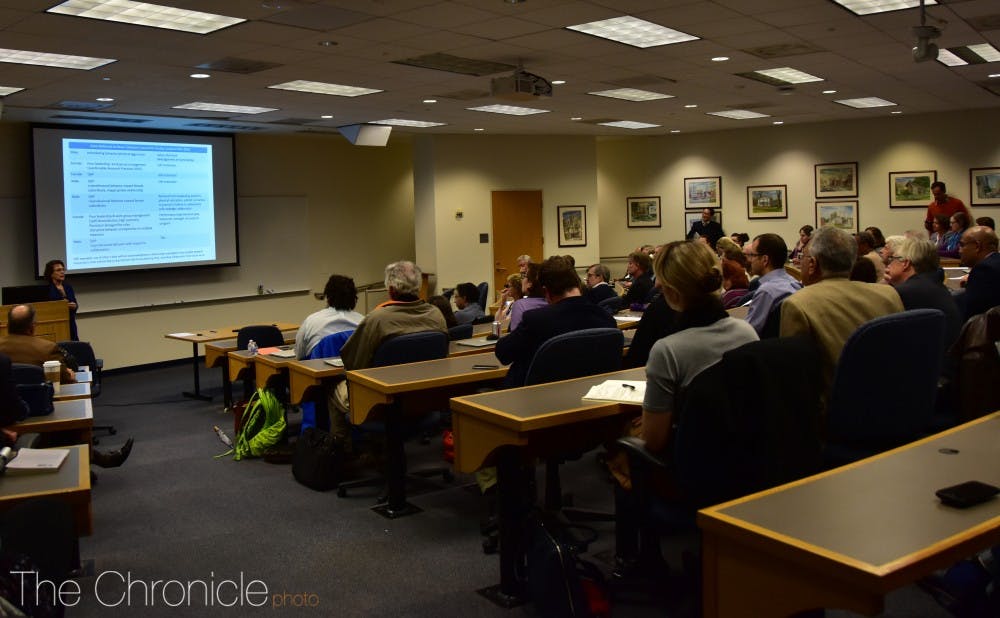Continuing its discussion about faculty conduct, Academic Council heard about steps Duke's School of Medicine has taken to address harassment and misbehavior among faculty at its Thursday meeting.
Ann Brown, vice dean for faculty at the School of Medicine, presented the medical school’s Dean’s Advisory Council on Faculty Conduct, launched in 2012 initially to address scientific conduct, but which is now utilized to address conduct and professionalism among faculty of the school.
The presentation is part of the Academic Council’s broader conversation about how to hold faculty accountable for harassment.
“We started looking under the covers a little bit to see what was going on in the research realm, and realized a lot of issues came up that were concerning to chairs, but the chairs were like, ‘I don’t quite know what to do about this,’” Brown said.
Brown cited incidents such as a professor throwing a bottle at a graduate student and a professor locking their students in a lab and not letting them out until they came up with results. She said that the professionalism council was needed for issues like this, which don’t have specific institutions to deal with them, unlike sexual misconduct, illegal behavior or research integrity issues.
She said ideally, faculty should resolve these issues at the unit level before presenting them to the council. If necessary, a chair will write to their dean about the concern, and the dean will then choose to resolve it themselves or refer it to the Dean’s Advisory Council on Faculty Conduct. The council can then advise the dean and provide a review process, although it cannot impose sanctions.
Since 2012, the Dean’s Advisory Council on Faculty Conduct has received seven cases. Although this is a small number of cases, Brown said, a high volume comes to the pre-council process, which deals with about ten issues per week. The seven cases ranged from intimidating behavior to poor leadership.
“When these cases finally come to us, common findings are [the faculty's] incredible lack of insight about their role in the problem,” Brown said.
Brown also cited poor management of power dynamics by faculty as another common finding.
Mark Anthony Neal, James B. Duke professor of African and African American studies, led the Academic Council’s discussion about whether to adopt a similar model at other Duke schools.
“What does compensation look like?” Neal said. “And that’s just an honest response to the demands on peoples’ times that you might have to spend sitting in one of these committees, adjudicating some sort of situation within a unit within your school.”
Academic Council Chairman Don Taylor, professor in the Sanford School of public policy, said that within the last two years, tenured faculty have not been involved in any academic conduct adjudication, a topic which the Council also discussed last week.
Joshua Sosin, associate professor of classical studies, said faculty members need to recognize that working on these committees does not interfere with their own academic work.
“We only had [time to ourselves] because we come up in a culture that says we can do whatever we want, without paying our community,” Sosin said. “We’ve been thinking it’s ours the whole time, when it wasn’t.”
Professor of Physics Steffen Bass commented on the academic culture that values “superstars,” saying that it should also be made clear to department chairs that they are not “the stewards for these superstars to facilitate their ecstasies.”
“They have to be the stewards for the weakest link in the department and their first duty is to protect the department from the superstars going overboard,” Bass said. “If a superstar gets fired, so be it.”
President Vincent Price responded to Bass, noting that the issue is not necessarily about superstars, but rather asserting collective ownership as faculty.
“I want superstars who are behaviorally contributing and elevating the bar and demonstrating by example it’s not an ‘either or’ proposition,” Price said.
Get The Chronicle straight to your inbox
Signup for our weekly newsletter. Cancel at any time.

